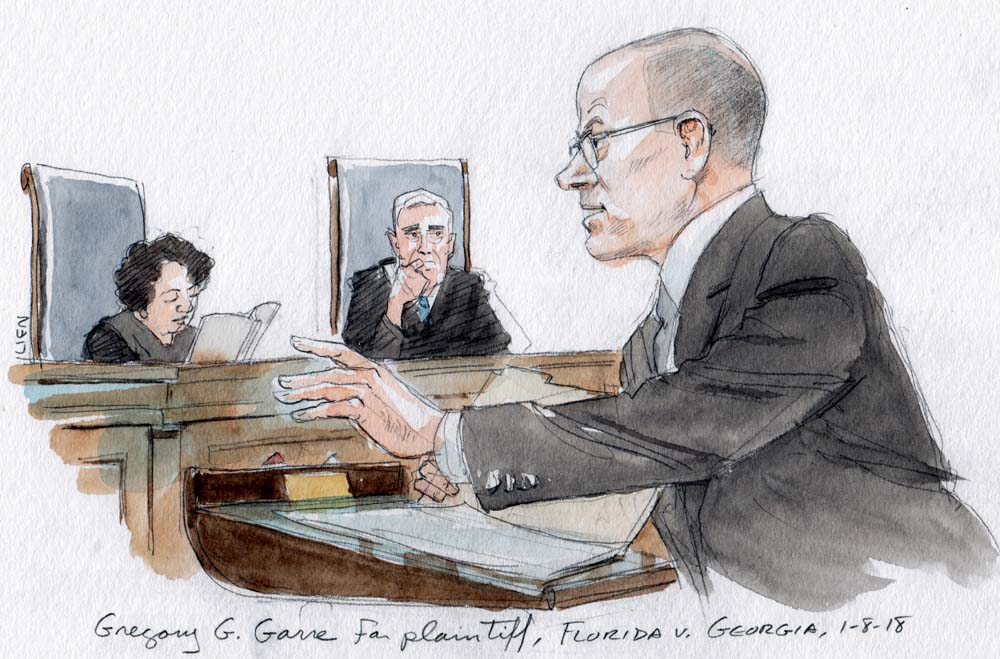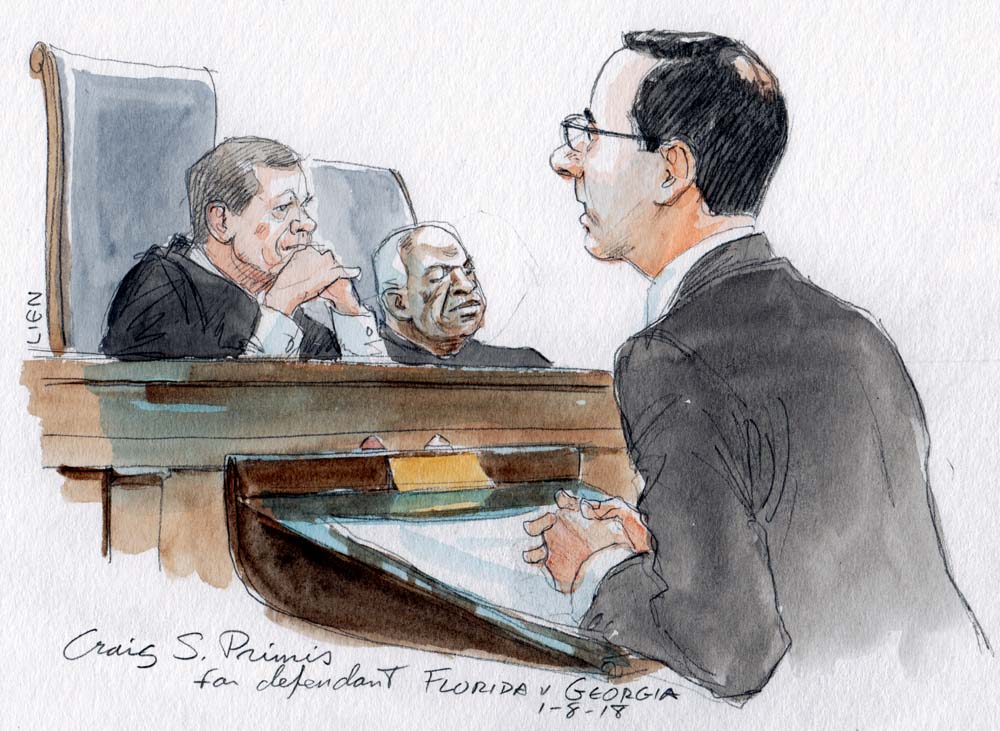Argument analysis: Can Florida’s needs for more water be “redressed” by a consumption cap in Georgia?

on Jan 9, 2018 at 9:11 pm

On Monday, the Supreme Court heard two back-to-back original jurisdiction water cases. As explained in more detail in my argument preview, the issues in Florida v. Georgia center around several key themes: whether a consumptive cap on Georgia’s water use would result in more water flowing into Florida’s Apalachicola Bay during times of drought or other times; what role the U.S. Army Corps of Engineers — which declined to intervene in the case — plays in ensuring delivery of any water saved; and what standard of redressability should be used. In February 2017, the special master in the case, Ralph Lancaster, issued a report recommending that the court deny Florida’s request for relief because the Corps was not a party to the case; without the Corps’ involvement, Florida could not be assured it would receive the additional water it was seeking.
Gregory Garre, arguing on behalf of Florida, began by noting that the special master had agreed “that Florida has suffered real harm as a result of Georgia’s ever increasing consumption of upstream waters” that is “unreasonable and largely unrestrained.” Despite this finding, Garre

Gregory G. Garre for plaintiff (Art Lien)
stated, the special master had “made a legal error” in finding that Florida had to show “complete relief” — that any water not consumed by Georgia would reach Florida.
Justice Ruth Bader Ginsburg jumped in, observing that the special master had focused on harm during drought years, not the benefits from more flows in non-drought periods. Garre responded, focusing both on the standard of redressability used by the special master and on how one could address the harms: both by providing more water during extreme low-flow periods and by reducing the frequency and severity of drought operations during less low-flow periods.
Justice Elena Kagan observed that Florida has “common sense” on its side: If water had not been consumed by Georgia, it would presumably flow to Florida. However, she questioned what was in the actual record at trial, including how much more water Florida might receive if Georgia had a consumption cap, and to what benefit. Ginsburg noted that Georgia’s expert testified that any water saved wouldn’t make enough of a difference to cure Florida’s problem.
The discussion shifted to the issue of redressability and what the evidence showed. Garre agreed that Florida bore the burden of showing redressability and that the consumption cap would help “cure the problem,” but argued that the special master had used an incorrect standard of redressability. Justice Sonia Sotomayor asked whether the record showed that a consumption cap would indeed provide Florida with more water; Garre pointed out several places in the record where experts opined that more water flowing from Georgia into Florida would be helpful. Sotomayor asked whether “your argument about the standard is that you didn’t have to prove the exact amount, you just had to prove that it was meaningful?” Garre agreed that the doctrine of equitable apportionment does not require absolute precision, later noting that the court has never required a party in a redressability case to prove “certainty of complete relief.”
Justice Neil Gorsuch asked about a “burden-shifting regime.” Garre reiterated that Florida had to show, by clear and convincing evidence, that it had suffered real harm because of Georgia’s upstream consumption; the burden then shifts to “Georgia essentially to show that the costs of the decree would be so much that they outweigh the injury that Florida is suffering.” Gorsuch pushed back, saying, “Look, I thought the burden ultimately was for the plaintiff who wishes to alter the status quo to show that the benefits he wishes to obtain significantly outweigh the harms that the relief he seeks would cause.”
Sotomayor chimed in, wondering how, if it is Florida’s “burden to prove the balance,” Florida had shown that the benefit to Florida is greater than the cost to Georgia. Garre noted that the parties disputed the costs, but the special master had not issued a finding on costs. Gorsuch summarized what he thought he heard: that Florida thought the special master had gone “off track on redressability, with non-drought years,” and he should have “conducted a more thorough balancing test in weighing the equities on the non-drought years.” Garre agreed, and said that Florida would like the special master to determine the full extent of Florida’s injuries, the costs Georgia would incur, and whether an equitable apportionment decree should be entered.
The discussion then shifted to the Corps’ involvement. Garre argued that the Corps’ March 30 record of decision on the master manual for operating the reservoir system for the Apalachicola, Chattahoochee and Flint River system was important because it recognized that the Corps would “seek to adjust its operations in a way that would facilitate” an equitable apportionment decree. Justice Stephen Breyer asked why the U.S. wasn’t a party to the case.
Garre closed by asking the Supreme Court not to accept the special master’s recommendation for three reasons: 1) Florida would benefit from a decree because it would “reduce the frequency, severity, and duration of drought operations,” 2) the Corps recognized in its March 30 record of decision that it would adjust operations according to any decree issued by the court, and 3) a decree would be part of the “constellation of law by which the Corps would have to operate.”
Craig Primis then argued on behalf of Georgia, stating: “Florida has premised this entire case on the proposition that a cap on Georgia’s water consumption alone would result in a material increase in water to Florida during a drought without any change to Army Corps operations. After two years of discovery and a five week trial, Florida failed to prove that case.” Chief Justice John Roberts immediately pushed back, saying that Florida seems to have premised its arguments on the fact that the Corps would change its operations in response to a decree. Roberts compared this to a contract-bidding-discrimination case, in which a person must show she was discriminated against in the process, not that she would have received the contract.
Primis focused on the Corps’ new master manual, noting that while others had challenged this manual, Florida had not. He stated that the new manual requires the Corps to release 5,000 cubic

Craig S. Primis for defendant (Art Lien)
feet per second in critically low periods to protect endangered species downstream, and meet other needs such as water quality, water supply in Atlanta, navigation, flood control and hydropower.
Ginsburg and Sotomayor jumped in with questions about whether a consumption cap on Georgia might prevent the situation in Florida from getting worse by allowing more flow during non-drought situations. Kagan again questioned the common-sense flow of water. After some discussion of drought versus non-drought operations, Gorsuch cited to the record, saying that the Corps “pretty darn clearly” anticipates “that in non-drought operations, there will be more water going through.” Primis noted that water supply during drought and non-drought periods is different; a model run during a drought period showed that even a 50 percent cap on Georgia didn’t “move” drought operations, nor was an increase of 71 days more water in 2007 “material.”
Breyer suggested that the solicitor general could hold a hearing with experts on “what would be best for the region, taken in light of all the demands, and Florida and Georgia and anyone else who wanted to, as an amicus, perhaps could participate.” Primis stated that a hearing would not make sense, in part because of the Corps’ process on its new master manual and the litigation that has already resulted. Sotomayor and Primis had a short discussion about what “harm” the government was looking at; Primis noted that the Corps must look at endangered species on the Apalachicola River, but does not have jurisdiction in the Apalachicola Bay.
Roberts wondered what standard Florida should be required to meet. Primis argued that under Colorado v. New Mexico and Colorado v. Kansas, Florida should be required to show by clear and convincing evidence that its requested relief will provide material benefit. He stated that Florida “did not prove that caps on consumption would redress their harm” and how the Corps might respond to a decree is “too speculative.” Discussion circled back to drought compared to non-drought periods, with Ginsburg stating that “[i]f the water is eventually going to get to Florida, that will help Florida. And that isn’t to say that it has to be immediately.” She further stated, “That was one of the problems with the Special Master’s report. He seemed to think that the benefit had to be immediate, instead of eventual.” Primis concluded by saying that “all the evidence shows conclusively” that Florida would not receive water if a consumption cap were in place in Georgia.
Edwin Kneedler, deputy solicitor general, argued on behalf of the United States as an amicus. He began by noting that this case was premised on the Corps’ operations being “taken as a given and any decree by this Court would not require a change in the Corps’ operations.” Because the federal government is a required party but has not waived its sovereign immunity, “the Court cannot order the Corps of Engineers to take any different operation.” Roberts immediately responded, noting that a decision from the court would be taken into consideration by the Corps based on the March 30th record of decision. Kneedler analogized to Arizona v. California, in which the court concluded that the Boulder Canyon project had already allocated water, so there was nothing left for the court to allocate under equitable apportionment; here, he said, Congress had delegated to the Corps the “responsibility for balancing all those different interests” through an extensive public process represented by the record of decision.
Breyer asked, “So, why don’t you just waive the sovereign immunity, get into this, and try to help the Special Master reach an equitable solution?” Kneedler responded that Congress had delegated power to the Corps, and “the Corps’ judgments would be reviewed under the APA, under the arbitrary and capricious standard, after it balances all of the interests.” He further noted that it is not the role of the court to determine, de novo, the role of the Corps.
Sotomayor pushed again on whether the consumption cap on Georgia would benefit Florida, and whether any extra release would provide a “material” benefit. Kneedler acknowledged that the government has not offered a position on this, but could do so as an evidentiary matter or as part of an amicus brief. He noted that Florida’s claim of injury cannot depend “just on whether there’s more water going through but what would happen as a result of that water. Would the ecosystem be improved?” He outlined several scenarios in which water saved in Georgia wouldn’t necessarily flow to Florida.
Roberts interrupted Kneedler’s explanation, saying, “It does seem fairly important. You say we can’t order [the Corps] to do something, but you’ve told us you will take it into account. And it seems to me that that’s arguably real redress to Florida, that you’re going to take into account a decision saying that, equitably, they’re entitled to more water, that Georgia is improperly taking its water.” Justice Anthony Kennedy asked whether the question of whether more water would help Florida could be asked when talking with the Corps about its expertise, and Breyer wondered what the Corps would do if they were sitting “right here in my shoes.” Kneedler closed by saying that Florida could challenge the Corps’ master manual by saying it does not provide sufficient downstream flows, or it could petition the Corps to adopt a new manual. Finally, he noted that its governing statutes may not allow the Corps to allocate more water for the Apalachicola Bay.
Garre responded briefly on rebuttal, arguing that the real problem is Georgia’s consumption, the only way to address it is through equitable apportionment, and there may be real prejudice to Florida notwithstanding the record of decision. In response to a question from Sotomayor, he pointed out that any improvement in flow would help Florida.
A decision in the case is expected by June.


